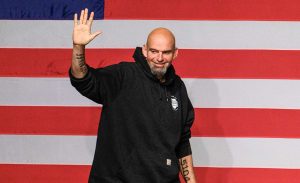A new memoir from Senator John Fetterman (D-Pa.) is shedding light on his turbulent rise to political prominence and the private battles that nearly cost him his life — and, as he now admits, possibly his Senate campaign.
The book, titled Unfettered, will be released Tuesday and includes a deeply personal account of the health and emotional struggles that defined Fetterman’s 2022 campaign for Senate. An excerpt published by The Free Press on Monday outlines his journey through physical recovery, depression, and the pressure of national politics, offering a rare look into the human toll of high-stakes campaigning.
A Near-Fatal Moment
Four days before Pennsylvania’s Democratic primary in May 2022, Fetterman suffered a major stroke while campaigning near Lancaster. He describes in the book how his heart stopped for several seconds before emergency care revived him.
According to Fetterman, his wife, Gisele Barreto Fetterman, recognized the warning signs when his face began to droop and immediately instructed aides to rush him to the hospital — a decision he says “saved my life.”
“If we had been any farther from the hospital, I would have died,” he wrote.
Despite the health scare, Fetterman stayed in the race and went on to win both the Democratic primary and the general election, defeating Republican challenger Dr. Mehmet Oz in one of the most closely watched Senate contests in the country.
Private Struggles Behind Public Appearances
Fetterman now says he regrets not stepping away from the race.
“In hindsight, I should have quit,” he wrote, reflecting on his limited ability to campaign effectively during recovery.
Following his stroke, Fetterman required real-time transcription during debates and interviews, as the condition temporarily affected his auditory processing. He admits that maintaining his campaign schedule while recovering took a psychological toll that continued long after his victory.
Fetterman writes that his depression — a struggle that, he says, predated his political career — intensified after the election.
Isolation and Recovery
After being sworn in as senator in January 2023, Fetterman says he found himself isolated and exhausted.
“I found a dark apartment in the basement of a building in Washington, and when I returned each night around 5 p.m., I’d lock the door, lie on my thin mattress, and welcome the dark,” he wrote.
He said he stopped eating, lost interest in music and coffee, and avoided conversation. By February, he checked himself into Walter Reed National Military Medical Center for inpatient psychiatric care.
“I wasn’t eating, and I wouldn’t talk to anybody,” he revealed.
In the book, Fetterman credits his treatment team — and one particular moment of clarity — for saving him.
“Children need their daddy,” a therapist told him. “Those words broke through the fog,” Fetterman wrote. “It reminded me why I had to get better.”
Three weeks later, he returned home to Pennsylvania, where he says the consistent presence of his family helped him rebuild his routine.
Political and Personal Reassessment
The second half of Unfettered reflects Fetterman’s changing perspective on politics. He describes himself as a moderate Democrat, at times at odds with party leadership over both policy and tone.
“I have never viewed my political party as an iron shackle adhering me to the party line,” he wrote. “I know this has cost me support from part of my base, and I’m at peace with that.”
He also questions how much longer he will remain within the Democratic Party, suggesting a growing disconnect with its national direction.
The senator has recently distinguished himself by crossing the aisle on several major votes — including measures to reopen the government after a prolonged 40-day shutdown. His votes broke from Senate Democratic Leader Chuck Schumer and placed him among a small group of Democrats and independents who sided with Republicans to end the standoff.
A Candid Look at Vulnerability in Politics
Fetterman’s transparency about his mental health has drawn both praise and criticism since his 2022 campaign. Supporters see his openness as a powerful statement against the stigma surrounding depression and recovery.
“His honesty is refreshing,” said Dr. Ellen Hayes, a psychiatrist specializing in trauma and public life. “It shows that political leaders are not immune to human frailty — and that acknowledging it doesn’t diminish their ability to lead.”
Critics, however, argue that the senator’s health struggles raise concerns about fitness for office — an issue that shadowed his campaign from the start.
Between Party Loyalty and Independence
In the book, Fetterman acknowledges these criticisms directly but says he remains committed to his responsibilities.
“I know what people said about me. I heard it. But I also knew my purpose,” he wrote. “I’m not here to make everyone happy. I’m here to do what I think is right.”
That philosophy has put him at odds with both his party’s progressive wing and its leadership. Some Democrats have expressed frustration at his willingness to collaborate with Republicans on budget and procedural issues.
Yet others see it as evidence of a more pragmatic approach — one that resonates with swing-state voters.
“Fetterman represents a rare kind of independence,” said Thomas Walker, a Pennsylvania political analyst. “He’s willing to speak openly about his struggles and his disagreements. That’s risky in today’s climate — but it’s authentic.”
Looking Ahead
As Unfettered hits shelves, Fetterman appears intent on reshaping his public image from a headline-driven figure to a more reflective and candid leader. His book tour is expected to focus as much on mental health advocacy as on politics.
The senator ends his memoir on a note of humility and uncertainty:
“I don’t know what comes next,” he writes. “But I know what matters — my family, my recovery, and the truth.”
Whether voters interpret his revelations as strength or vulnerability remains to be seen, but Fetterman’s openness ensures that his story — both political and personal — will continue to resonate far beyond Washington.

Emily Johnson is a critically acclaimed essayist and novelist known for her thought-provoking works centered on feminism, women’s rights, and modern relationships. Born and raised in Portland, Oregon, Emily grew up with a deep love of books, often spending her afternoons at her local library. She went on to study literature and gender studies at UCLA, where she became deeply involved in activism and began publishing essays in campus journals. Her debut essay collection, Voices Unbound, struck a chord with readers nationwide for its fearless exploration of gender dynamics, identity, and the challenges faced by women in contemporary society. Emily later transitioned into fiction, writing novels that balance compelling storytelling with social commentary. Her protagonists are often strong, multidimensional women navigating love, ambition, and the struggles of everyday life, making her a favorite among readers who crave authentic, relatable narratives. Critics praise her ability to merge personal intimacy with universal themes. Off the page, Emily is an advocate for women in publishing, leading workshops that encourage young female writers to embrace their voices. She lives in Seattle with her partner and two rescue cats, where she continues to write, teach, and inspire a new generation of storytellers.









